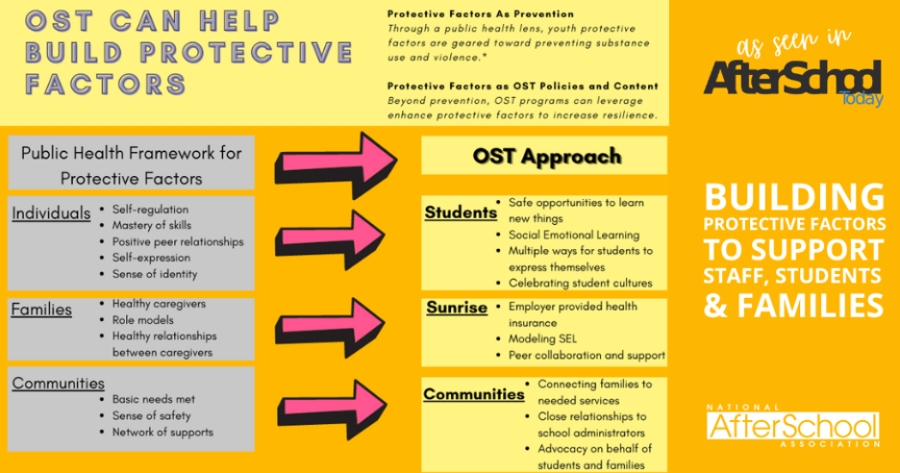Protective Factors, as opposed to Adverse Childhood Experiences (ACEs), are the experiences and assets in our lives that increase our threshold to toxic stress and build our resilience. At Sunrise, our implementation of trauma-informed practices before the pandemic focused on tools to increase self-regulation and de-escalation among staff and students, which fell more into the realm of “behavior management” rather than a healing-centered approach. Our approach reduced disciplinary incidents and tension between colleagues but felt like triaging a larger set of issues without addressing underlying causes or drivers. Investing in protective factors to enhance resilience became a logical next step.
Resilience, like self-care, has become a loaded, misused, and commercialized concept. Reality demands a community-based approach to healing. OST professionals and programs play a crucial role in helping tip the scales in favor of youth well-being by stewarding spaces and experiences for youth to tap into existing, safely develop new strengths, and increase the web of support surrounding them. As it turns out, these are all protective factors.
Sunrise uses asset mapping to identify existing resources in the communities we serve, to understand exactly which protective factors are already at work within our program and which we could enhance to increase resilience. Some of the commonly recognized categories of protective factors relate to individuals, families, and communities. We reframed individuals as “students” and family as “Sunrise” and realized we were already drawing upon and investing in a number of student protective factors.
Enhancing protective factors is an area where OST professionals and programs have always excelled. Students who consistently participate in high-quality OST programs develop strong social-emotional competencies and broaden their web of supportive peers and adults. Sunrise began by mapping out ways we already do this, how we could do more and what is outside of our control.
We were then able to intentionally incorporate more opportunities for students to experience mastery, express themselves, celebrate our cultures, and practice healthy conflict resolution. We have designed professional learning that promotes modeling healthy adult relationships. We have also invested in caregiver stability by creating more full-time roles that include benefits and pay increases that have resulted in lower turnover, which translates to greater predictability for students. While Sunrise focuses exclusively on OST, we still impact community-level protective factors, like school climate, by building close relationships with school administrators and connecting the families we serve to partner organizations that support basic needs.
COVID-19 has exacerbated already deep societal wounds. Taking a healing-centered approach that builds upon the strengths already present in our communities has shown us new ways to confront these unprecedented challenges and improve our programming now and into the future.
Contributed by Sunrise of Philadelphia’s Trauma and Curriculum Specialist, Marina Frader. Originally featured in the Spring 2022 edition of Afterschool Today.

